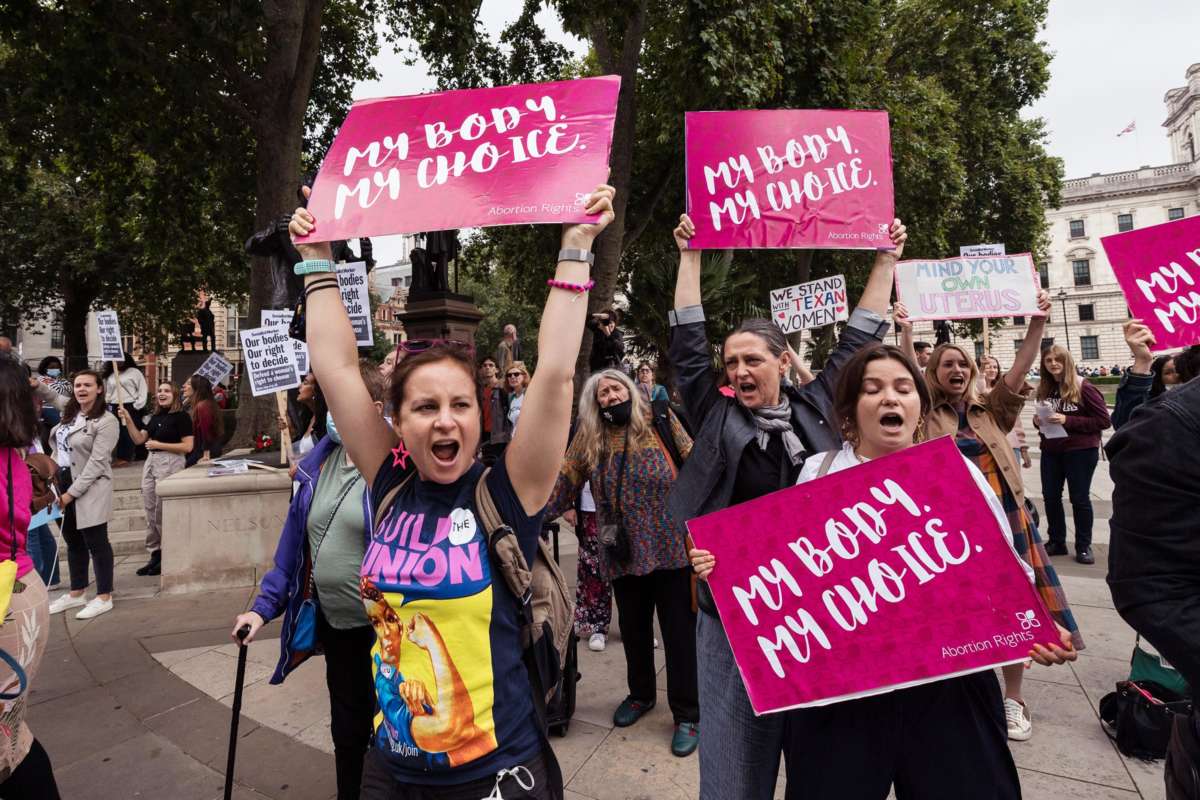The United States Department of Justice (DOJ) just made a formal announcement that it has filed a lawsuit against the state of Texas over its newly implemented abortion law, which imposes serious barriers against accessing the medical procedure after six weeks of pregnancy.
The department filed its complaint in the United States District Court for the Western District of Texas on Thursday afternoon.
“It is settled constitutional law that ‘a state may not prohibit any woman from making the ultimate decision to terminate her pregnancy before viability,'” the DOJ’s lawsuit contends, citing the two most significant abortion-related Supreme Court cases in U.S. history, Planned Parenthood v. Casey and Roe v. Wade. “But Texas has done just that.”
Noting that the state’s abortion law puts individuals in charge of enforcement rather than the state by encouraging residents to sue abortion providers or just about anyone who assists a person access the procedure for up to $10,000, the DOJ said that “it takes little imagination to discern Texas’s goal.” Lawmakers in Texas, the lawsuit says, sought to “make it too risky for an abortion clinic to operate in the State, thereby preventing women throughout Texas from exercising their constitutional rights, while simultaneously thwarting judicial review.”
The federal government is seeking an injunction on enforcement of Texas’s law until it can be further examined. There’s a high likelihood that the case could make its way up to the Supreme Court, which previously refused to hear challenges to it, citing the lack of an aggrieved party. However, it was clear that the law was having a chilling effect on persons seeking abortions in the state, as several clinics stopped setting up appointments for the medical procedure effective September 1 when the statute took effect.
“The Department of Justice has a duty to defend the Constitution of the United States, and to uphold the rule of law,” Attorney General Merrick Garland said at a press conference announcing the lawsuit. “Today we fulfill that duty.”
This is an update from a previous story. The original appears below…
The United States Department of Justice (DOJ) is planning to file a lawsuit, as early as Thursday, against Texas over its highly restrictive anti-abortion law, which went into effect earlier this month.
According to The Wall Street Journal, which first reported on the news, the department has not decided on the grounds for the lawsuit against Texas, but it does plan to argue that the new law, among other things, “illegally interferes with federal interests.”
The news of the DOJ’s plans to use litigation to stop the enforcement of Texas’s ban on abortions beyond the sixth week of pregnancy comes after Attorney General Merrick Garland said on Monday that the department is “urgently explor[ing] all options” on the table to “protect the constitutional rights of women and other persons.”
Beyond restricting the ability of a person to seek an abortion after six weeks, the Texas law is unique in that it places the onus of enforceability on private individuals rather than on the state. In other words, it effectively empowers Texas residents to sue abortion providers and anyone who aids a person seeking an abortion — including a ride share driver who drives a person to a clinic — for sums of up to $10,000. Because of this aspect of the law, the Supreme Court ruled earlier this month that it would not intervene in the enforcement of the law until there was an aggrieved party in a civil suit instigated by the law.
Although the lawsuit from the DOJ could be filed as early as Thursday, it’s possible that it may come at a later date as the department pursues all the tools available to block enforcement of the restrictive state law. Late last week, President Joe Biden promised a “whole-of-government” response to the Texas statute, stating that both the DOJ and Department of Health and Human Services would work to ensure abortion remained accessible in the state.
“I was told that there are possibilities within the existing law to have the Justice Department look and see whether there are things that can be done that can limit the independent action of individuals in enforcing … a state law,” Biden said.
Indeed, appearing on MSNBC earlier this week, Harvard Law School professor Laurence Tribe said that many legal precedents exist to give the United States attorney general the authority to sue a state on issues such as these.
“There are all these cases in which the Supreme Court has said you cannot give governmental power over people’s lives or liberty to private bodies that have no public accountability,” Tribe said.
The DOJ could even state that the Texas statute goes against international law, Tribe suggested, mirroring the opinions that human rights lawyers from the United Nations (UN) have also asserted in recent days.
“This new law will make abortion unsafe and deadly, and create a whole new set of risks for women and girls,” said Melissa Upreti, chair of the UN’s working group on discrimination against women and girls. She further pointed out that the Texas provision “violates a number of rights guaranteed under international law” and represents “structural sex and gender-based discrimination at its worst.”
Join us in defending the truth before it’s too late
The future of independent journalism is uncertain, and the consequences of losing it are too grave to ignore. To ensure Truthout remains safe, strong, and free, we need to raise $43,000 in the next 6 days. Every dollar raised goes directly toward the costs of producing news you can trust.
Please give what you can — because by supporting us with a tax-deductible donation, you’re not just preserving a source of news, you’re helping to safeguard what’s left of our democracy.
